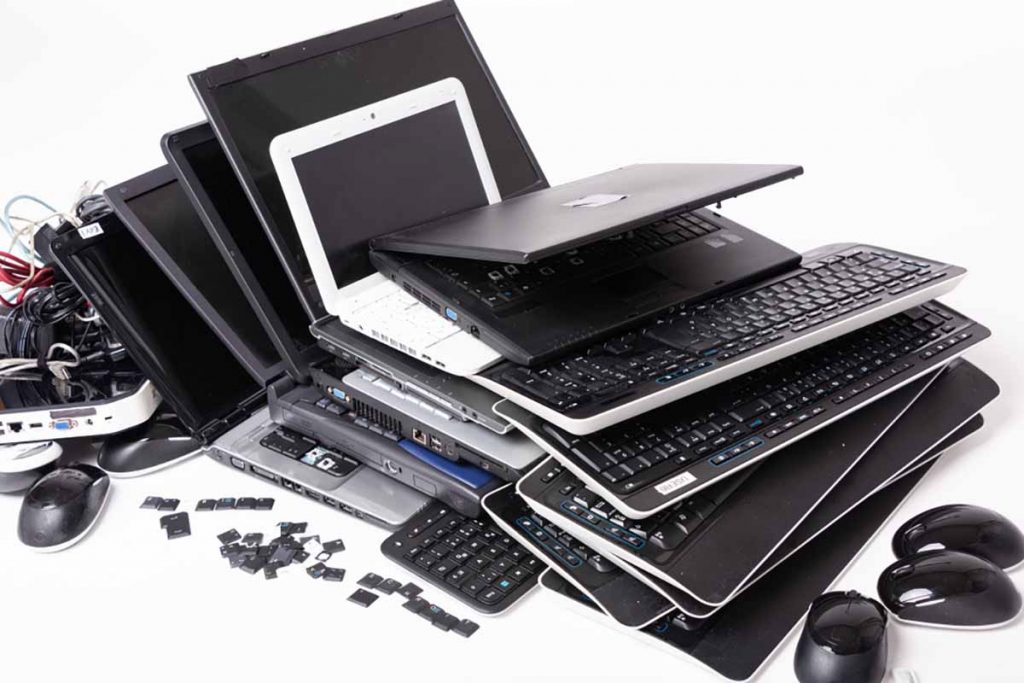
Research shows there are nearly 60 electronics processing facilities in Texas, some focusing on refurbishment and reuse exclusively. | penofoto / Shutterstock
A state report examining recycling in Texas found there is ample capacity for e-scrap processing, but collection remains a major challenge.
The Texas Commission on Environmental Quality (TCEQ) recently published the final report covering its “Recycling Market Development Plan.” The report was required by Senate Bill 649, which passed in 2019, and the state commissioned a team to complete the project, led by consulting firm Burns & McDonnell.
The study’s purpose was to “develop a plan to stimulate the use of recycled material feedstocks in processing and manufacturing,” according to the final report. It examined all material streams and reported specific details on electronics recovery in the state. It looked at e-scrap collection and recycling, but it did not cover electronics refurbishment and reuse.
The document noted that 35.1 million pounds of e-scrap were recycled in 2019. Meanwhile, the study estimated the state disposed of 531.4 million pounds, meaning there is a significant supply of available material to capture.
“Electronics recyclers in Texas indicate that they could process more material, and there is additional material that is being disposed that could be recycled,” the report found. “Thus, the demand for material exceeds supply.”
Collection data and processing infrastructure
Overall, there are nearly 60 electronics processing facilities in Texas, the study found, but some of them only perform reuse and refurbishment services, outside the scope of the study. The authors surveyed more than 40 electronics recycling companies but none responded to provide information.
“There were inherent challenges to collecting data from electronics processors,” study authors wrote. “For instance, many electronics processing facilities in Texas are part of national or multinational corporations that require corporate-level approval for the release of any data, so many companies were not able to participate because they were unable to obtain corporate approval. It should be noted that many of these facilities may focus significant efforts on reuse/ refurbishment and have minimal recycling data to report.”
Instead, the study relied largely on state program collection quantities and estimates based on data reported through a state hazardous waste collection program. Through these and a few other sources, the report came up with the 2019 weight estimate.
The state e-scrap extended producer responsibility programs, which cover computers and TVs, together accounted for nearly 60% of collected weight.
The 2019 figure of 35.1 million pounds represents a substantial drop from a 2015 data collection effort, when the state reportedly recycled 85.5 million pounds of e-scrap. Study authors said a number of factors played into this drop, including a decrease in the number of facilities that responded to the survey and an overall decrease in processing facilities operating in Texas.
“Additionally, the downward trend in the weight per unit of electronics likely contributed to the decrease in the tonnage of electronics reported as recycled,” the study stated. “The decreasing trend in weight of recycled electronics has also been observed in other states including Illinois, Pennsylvania and Wisconsin. Recent academic research suggests that nationwide electronic waste generation and recycling tonnages are declining due to decreasing weight of devices and waste electronic tonnages may have peaked in 2014-2015.”
Despite the decrease in processing facilities, the report identified e-scrap as a material that still has “ample processing capacity within the state.” Increased recovery of electronics could provide an economic boost for Texas businesses, the report added.
The report found there are end markets for some recovered plastic and metals in Texas, but that a large portion of the processed e-scrap commodities leaves the state.
More stories about research
- Project brings rare earth recovery into e-scrap facility
- Texas A&M researches rare earth extraction
- Report: Battery ‘retirement tide’ nears


![ARC-Banner-300x250[1][4][3].jpg Midwest Copier Exchange - An ARCOA Group Company](https://resource-recycling.com/e-scrap/wp-content/uploads/sites/2/2021/07/ARCOA-Banner-ESN-07-19-21.jpg)
